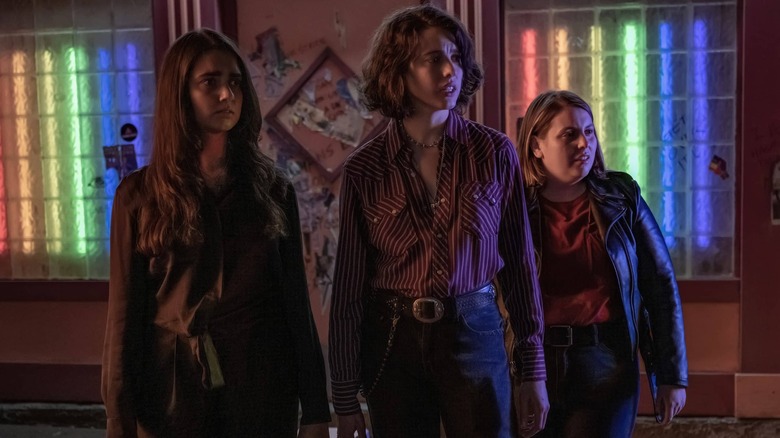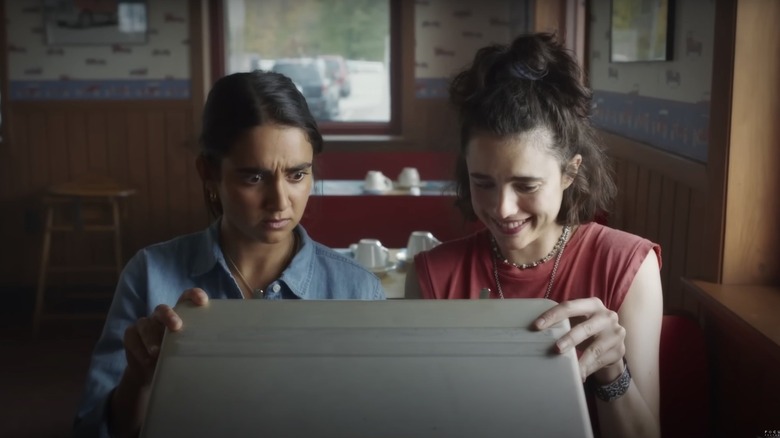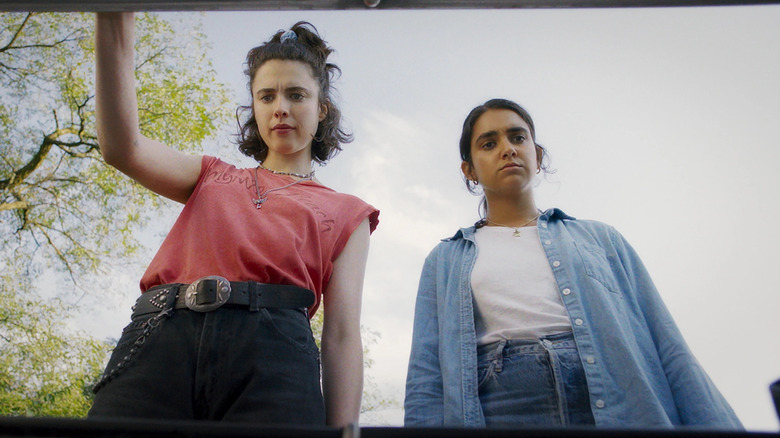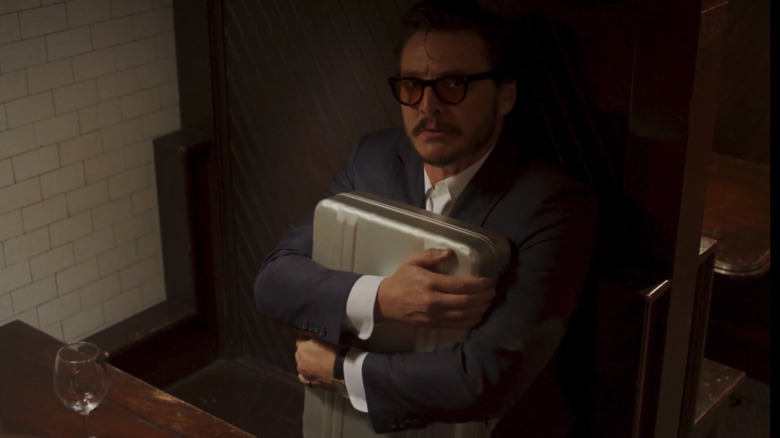Drive-Away Dolls Review: A Tidal Wave Of Naughty Lesbian Energy
Ethan Coen's queer roadtrip film "Drive-Away Dolls" is set in 1997, and feels like an escapee from that era, for better and for worse. On the one hand, it possesses all the impish, make-the-straights-squirm energy of a legit '90s indie lesbian farce. It is not just upfront about its queerness, but confrontationally playful about it. "Drive-Away Dolls" unapologetically and cartoonishly plunges audiences into lesbian basement make-out parties and rowdy gay bars, flinging about cunnilingus jokes, masturbation scenes, and multiple on-screen dildos with gleeful impunity. It's a lightweight, weirdly teen-friendly (but very R-rated) slumber party movie with an upbeat and liberating "be gay, do crime" vibe. It's a queer, hand grenade-shaped squeak toy.
On the other hand, however, "Drive-Away Dolls" is being released in 2024, and the very fact that it depicts queer characters having queer sex and talking about queer issues isn't nearly as confrontational as it once was. There was a time when films like "But I'm a Cheerleader," "Better Than Chocolate," or Cheryl Dunye's incredible "The Watermelon Woman" could wield their lesbian energies as a political weapon; in the 1990s, merely filming two women having sex was enough to pop the appropriate monocles off the faces of the most tightly-wound squares. In 2024, after a generation of queer cinema and scads of gay, lesbian, and trans characters on hit TV shows, something like "Drive-Away Dolls" isn't going to make as deep an impact.
Coen's film is an utter hoot, and its wild rainbow energy is infectious, but it feels weirdly dated. Had the movie come out in 1997, we'd still be talking about it to this day as a classic of neo-queer cinema.
The mysterious suitcase
The film's parallels to the indie scene of the 1990s — and other notably weird cult movies of the '80s — don't end with its mere gayness. Like in "Pulp Fiction," there is a mysterious steel suitcase deeply coveted by a wide variety of criminals and scumbags. The vicious/pathetic toughs (in this film, played by strongly reliable character actors Joey Slotnik and C.J. Wilson) could have been lifted out of multiple '90s Coen Bros. movies, or perhaps one of their many scuzzy knockoffs (remember "Clay Pigeons"?). Alex Cox's 1984 classic "Repo Man" was also a powerful influence, in that the main characters are driving a coveted car with a mysterious and unexpected series of artifacts in its trunk.
Margaret Qualley plays Jamie, a brusque, horny, lascivious lesbian powder keg, armed with a Texan drawl that falls in a matrix between mega-Holly Hunter and Senator Claghorn. Her best friend is the shy, bookish nerd Marian (Geraldine Viswanathan), who reads Henry James and who hasn't been laid since she broke up three years ago. When Jamie is thrown out of her apartment by her rightfully jealous girlfriend Sukie (Beanie Feldstein), she gathers up Marian and convinces her that a sex-fueled road trip will cure them both. Marian is moving to Tallahassee and will be driving there in a drive-away (that is: transporting another person's car for hire).
Naturally, there is a mix-up at the drive-away outlet, and the girls end up driving a car that was intended to transport illicit goods. We know the suitcase once belonged to a mysterious collector played by Pedro Pascal and has something to do with a rising right-wing politician (a cameo from an A-list actor). The silky smooth gangster on their tail is played by Coleman Domingo.
Quite a shenanigan
We are also given a few Austin-Powers-ready 1960s psychedelic hints as to what might be in the case, and the colorful tie-dye swirls that occasionally interject into the action contain cameos from Miley Cyrus. One might be reminded of "The Big Lebowski" in this regard. In their 1998 film, the Coens pointed out that both the weed-smoking hippie idealism of the 1960s, as well as the Vietnam War obsession of the generation's grumpier members, was out-of-date by 1991 (when the film is set), and that the Flower Power generation had devolved into useless slackers. What the f*** does anything have to do with Vietnam?
"Drive-Away Dolls" seems to argue that the drug-fueled indiscretions of the 1960s directly informed the ultra-conservative backlash that was constantly bubbling up under the 1990s. This may be a somewhat astute observation, but analyzing what led to the George W. Bush administration and the ascendency of Roger Ailes' revolting media regime might seem a behind-the-times essay in the post-Trump era.
There is a scene wherein Marian, a queer Indian woman, is stopped by a white cop in the South. Had this film been set in 2024, her fate might have been much darker than a mere night in the hoosegow.
But "Drive-Away Dolls" has no darkness on its mind. What we have here is a tidal wave of trippingly naughty queer energy to counteract American conservatism. "Drive-Away Dolls" allows Viswanathan and especially Qualley to run rampant with their youthful silliness, making out with dozens of girls and spreading rainbows wherever they go. It's not exactly a middle finger to the establishment — there's no righteous rage here — but it is a gentle slap in the face with a big rubber phallus.
Joel vs. Ethan
Coen co-wrote "Dolls" with his openly lesbian wife Tricia Cooke. Although Cooke had been frank about her sexuality, she and Coen have been married since 1993, and have had two kids together. The details of their personal lives have only recently been made public. Cooke has also served as an editor and as an associate producer on many of the Coen Bros. movies. She and Ethan have been cooking up a lesbian road trip crime comedy for many years, and their original title for the film was "Drive-Away Dykes." Though Ethan has the sole directing credit in the final cut, reports have stated that Cooke was essentially a co-director in addition to her co-writing duties.
This movie marks Ethan Coen's second time as a solo director without his brother Joel, having previously directed the 2022 documentary "Jerry Lee Lewis: Trouble In Mind." It's also the first narrative film that Ethan has made since 2018's "The Ballad of Buster Scruggs," a film that made him burn out on filmmaking a little bit.
Having now seen both "Drive-Away Dolls" and Joel's solo directorial effort "The Tragedy of Macbeth," one can see what each brother may have brought to the table. Joel was the moody intellectual, apparently bringing a sense of sardonic bleakness to his works. Ethan, conversely, seems to have brought the colorful, humorous quirkiness and outsize characters. That balance — between clueless lovable weirdos and apocalyptic hubris — was what made the Coen Bros. unique.
Remove the bleakness, and one comes away with "Drive-Away Dolls," a film no darker than a pitcher of lemonade. Dated or not, it's still going to be refreshing under the right circumstances, and grand to see queerness flung so gleefully about.
/Film Rating: 7.5 out of 10



